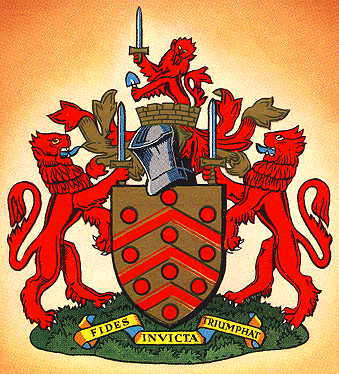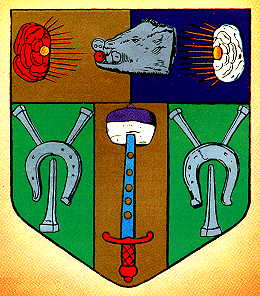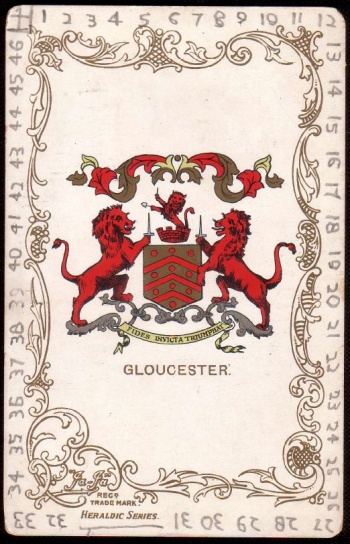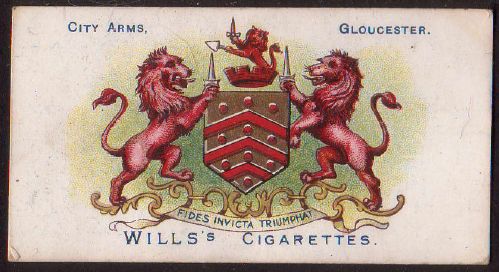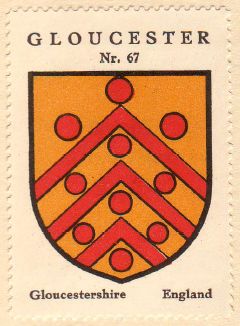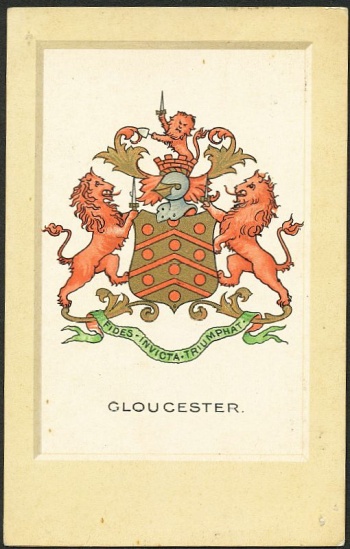Gloucester (England)
| Heraldry of the World |
| British heraldry portal Civic heraldry of the United Kingdom |
|
GLOUCESTER
Official blazon
Arms : Or three Chevronels between ten Torteaux Gules three three three and one.
Crest : Issuant from a Mural Crown Or a demi-Lion guardant Gules holding in his dexter paw a Broadsword and in his sinister paw a Trowel proper.
Supporters : On either side a Lion Gules holding in the dexter fore-paw a Broadsword proper.
Motto : 'FIDES INVICTA TRIUMPHAT' - Unconquered faith triumphs or Faith indomitable wins through.
Origin/meaning
The city of Gloucester has a proud and colourful history which is clearly illustrated through its two distinct coats of arms. The earliest version is often referred to as the Tudor Coat and was granted in 1538 during the reign of Henry VIII. The Commonwealth Coat was presented to the city in 1652 and finally granted again on April 16, 1945.
Tudor arms
The Tudor coat is heraldically speaking unusual but attractive. The roses appear to refer to those of Lancaster and York, the boar's head to the badge of Richard, Duke of Gloucester, afterwards King Richard III, who granted the Town its Charter of Incorporation in 1483. The horseshoes and nails are symbolic of the early trade of Gloucester which in the twelfth century, and probably before, was famous for its ironworks and smithery.
Commonwealth arms
These arms were presented to the city in 1652 at an event described as the Herald's Visitation of the County of Gloucester. The arms comprise a shield in gold with three red chevronels and ten torteaux in a three, three, three and one pattern but without the later crest or supporters.
The city proved its right to these arms at that Visitation and although there is little doubt that this coat was in use prior to the granting of the Tudor Coat in 1538, unfortunately there is no record of its origin.
The resultant grant of 1652 incorporated the ancient shield with the addition of a crest, supporters and motto.
It is probable that the motto was adopted as a tribute to the spirit of the citizens of Gloucester who successfully held the besieged city in the Parliament cause of 1643.
On the Restoration of the Monarchy in 1660, the crest and supporters of the Commonwealth coat were declared null and void since they were granted during the Commonwealth.
The city council was, however, seemingly reluctant to abandon the arms which had been assigned to it by the de facto Garter of the Commonwealth regime, and was probably fortified in its determination to adhere to the arms in the knowledge that they had proved their right to the shield in the reign of James I.
The Commonwealth coat has been in continuous use ever since without serious challenge, but the city council finally decided to regularise the position by having the coat recorded in the College of Arms and legally granted to them by Letter Patent dated 16 April 1945.
| The arms as used on a JaJa postcard +/- 1905 |
The arms on a Wills's cigarette card, 1906 |
| The arms in the Coffee Hag albums +/- 1925 |
The arms as used on a Faulkner postcard +/- 1905 |
Contact and Support
Partners:
Your logo here ?
Contact us
© since 1995, Heraldry of the World, Ralf Hartemink 
Index of the site
Literature : Image and information provided by Laurence Jones (laurencejones@eircom.net)


